もはや、「もったいない」は国際語になりつつありますね。この言葉を世界的に広めたのがノーベル平和賞を受賞したワンガリ・マータイさんです。いまさらですが、いや、今だからこそなのかもしれませんが、その基となった2005年3月5日国連アースディにおける講演の訳が手に入りましたのでご紹介します。(ごめんなさい、ちょっと長いです。)
************************************************
Earth Dayにむけて、四つ目のR ~Reduce,Reuse,Recycle...Repair~
ワンガリ・マータイ
2004年、ノルウェーのノーベル賞審査委員会は革命的な決定をしました。
平和というものの捉え方を広げたことで、環境保護論者が初めてノーベル平和賞に選ばれたのです。委員会のコメントは、「平和な世界を望むのならば、我々は地球環境に責任を持ちそれをこの先も残りうるものにしなければならない。
我々はまた資源を公平に一地方で、あるいは国家レベルさらには地球規模で共有していかなければならない。」というものでした。
賞を頂いてからというもの、私はノーベル賞審査委員会のこの革新的なコメントとともに世界のあちこちを旅してきました。この金曜日、Earth Dayは35回目を迎え、その祝典は地球環境を守り育てていくために私たち皆が日常生活の中で何ができるのかということを考えさせる機会を与えてくれました。これ以上の場は他にはないでしょう。最近発表された「2000年生態系調査報告」は自然というのは実に多くの役割を果たしており、世界的な生態系の衰微は人類の安寧幸福に無視できない悪影響を与えているとしています。1,300人の科学者が編集に参加したレポートは以下のように伝えています。「すべての生命を生かしている自然中の重要な役割ー清らかな水と洪水の防止や天候が森のもつ力によって安定させられていることなどーはすでにその60%が悪化もしくは危機に瀕している。」
自然は快適さを利用するといったものではありません。このことは私たちが生き延びていくための能力の根幹を成す構成要素であり、平和の将来性を確立するための柱です。
三十年近く前のことですが、私はグリーン・ベルト・ムーブメントのさきがけとなった七本の木を植えました。それ以来、女性たちは、(幾人か男性もいますが)ケニア全土に三千万本以上の木を植えてきており、さらにこの取り組みをアフリカの多くのほかの国々に広めてきました。
グリーン・ベルト・ムーヴメントを通じて何千もの、それも多くは貧しく田舎の生活共同体が知識の不足や不安を乗り越え地球に対して積極的な行動を取ることができるようになって来ています。彼らの生計も安定してきました。木々は燃料や飼い葉を与えてくれ、土地の荒廃を防ぎ、少しの収入さえもたらしてくれます。
我々が学んだ最も重要なことのひとつは市民はより公的な権限を与えられる必要があるということです。彼ら自身や子供たちも欲している人生は環境を守り再興するとともに私が「民主的な場」と呼ぶものを広めることに参加したときにのみ実現されるということを感じる必要があるのです。他人が世話を焼いてくれるのを待つことはできません。自分自身のために行動しなければならないのです。
さもなければ、生態系を人間や他の生き物の利用に耐えうるように保全する最良の理論はただ理論のまま終わってしまいます。
先ごろの日本訪問でわたしは 「mottainai・もったいない」 という概念を学びました。その日本語のひとつの意味は「なんと無駄なことか」といったところです。またこの言葉は環境保護論者たちが何年も運動してきた、reuse:(再度使う) reduse:(減らす) recycle:(再利用する)という「三つのR」をうまく捕らえた言葉でもあります。私は国連環境計画の長であるKlausT・fer氏の提案するrepair(必要な資源を修繕、修理する)の「R」をさらに加え、「mottainai」を世界的な運動にしようとしています。
度を越した消費が著しい裕福な国でも私たちはmottainaiを実践できますし、環境の荒廃が貧困層をさらに貧しくさせ、彼らのあてにしている生態系が修復不能なほど劣化させられているような地方であっても同じです。
私は公的機関や製造業者たちに薄くすぐに破れてしまったり一度使っただけで捨ててしまうビニール袋を使わないよう呼びかけています。
こういった袋はゴミ捨て場を埋め尽くし同時にケニアやほかの国々の景観も損なわしめます。そして蚊を養いマラリアの温床にもなります。
もし私たちが買い物に行く時ビニール袋のかわりにもっと長持ちして環境に配慮した入れ物を使えば、バスケットや布織りのような伝統産業も活性化されます。
これは世界的な傾向になるでしょう。ケニアが女性たちが持続的に収穫されるサイザル麻で編んだバスケットを大量に、それも地方経済を発展させるため公正な価格で輸出を始るめる。このことは地球環境の保全、農家の暮らし向き、公正な取引といったものに重要な貢献をするでしょう。これはひとつの例に過ぎません。
私はあなたがたが自分の生活、地域社会、国に関連するほかの例を考えつくことを確信しております。
私が日本で出会ったある教授がハチドリの物語を教えてくださいました。
ハチドリの住んでいた森が火事になったとき、ほかの動物たちは身を守るため逃げ出しました。しかしハチドリは森にとどまり、近くの川に飛んでいってくちばしに汲んできた何滴かの水を火にたらすのでした。
離れたところからほかの動物たちがハチドリを見て笑いあざけりました。「自分のしていることを分かっているのか?」彼らが叫びます。「この火事はどうしようもないよ。君は何もできないぜ。」
ハチドリがようやく振り返って言うことには「私はできることをやっているんです。」
今日のこのEarth Dayに、またいつの日も、mottainaiを単なるスローガンにせず現実のものにさせましょう。自分に出来るならどんなことでもするーこのことであのハチドリのようになれるのです。
2004年度ノーベル平和賞受賞者、ケニア環境省次官、Tetu選挙区議会メンバー、グリーンベルトムーブメント発起人 ワンガリ・マータイ
原文です。
Fourth 'R' for Earth Day - Reduce, Reuse, Recycle ...
Repair by Wangari Maathai
In 2004, the Norwegian Nobel committee made a revolutionary decision. In awarding the Nobel Peace Prize to an environmentalist for the first time, the committee broadened the concept of peace. The message the committee sent was this: If we want a peaceful world, we have to manage our environment responsibly and sustainably. We also have to share natural resources equitably at local, national, and global levels.
Since winning that prize, I have traveled to many parts of the world sharing the groundbreaking messageof the Nobel committee. Friday, the 35th celebration of Earth Day provides us the opportunity to rededicate
ourselves to doing all we can in our daily lives to protect and nurture the Earth. There can be no better time. The recently released Millennium Ecosystem Assessment Report shows that nature provides so many "services" that the decline of ecosystems worldwide has measurable deleterious effects on human well-being. The 1,300 scientists compiling the report found that 60 percent of nature's vital services that make all life possible - including fresh water and the flood protection and climate-stabilizing capacities of forests - are already degraded or in danger.
Nature is not an amenity to be drawn upon. It is a fundamental component of our ability to survive - and a central pillar in expanding the ossibilities for peace.
Nearly 30 years ago, I planted seven trees that led to the creation of the Green Belt Movement. Since then, women (and some men) have planted more than 30 million trees across Kenya, and we have shared our approach
with many other countries in Africa.
Through the Green Belt Movement, thousands of communities, largely poor and rural, have been able to transcend ignorance and fear and take positive action for the earth. In the process, they have also secured
their own livelihoods, as the trees provide them with fuel, fodder, protection against soil erosion, and even a small income.
One of the most important lessons we learned is that citizens need to be empowered. They need to feel that the life they want for themselves and their children can be achieved only when they participate in protecting and restoring their environment and expanding what I like to all "democratic space." They can't wait for others to do it for them; they need to take action themselves. Otherwise, the best theories about how to preserve ecosystems for use by humans and other species will remain just that: theories.
On a recent visit to Japan, I learned the concept of mottainai. One meaning in Japanese is "what a waste."
But it also captures in one term the "Three Rs" that environmentalists have been campaigning on for a number of years: reduce, reuse, and recycle. I am seeking to make mottainai a global campaign, adding
one more "R" suggested by Klaus T・fer, the head of the UN Environment Program: "repair" resources where necessary.
We can practice mottainai in rich countries where overconsumption is rampant, and we can do it in regions where environmental devastation is causing the poor to get poorer and the ecosystems on which they depend to be degraded, some beyond repair.
In my case, mottainai means continuing to plant trees, particularly now that the long rains have come to Kenya. I have also called on my parliamentary colleagues to ensure that government offices use both
sides of each sheet so we can halve the amount of paper we consume.
I am urging the public (and manufacturers) not to use plastic bags that are so thin they tear almost immediately, or are used once and then thrown away.
These bags clog waste dumps and blight the landscape in Kenya and other countries. They also provide good breeding grounds for malaria-carrying mosquitoes.
If we did not use these bags, and instead carried our shopping in more long-lasting and environmentally friendly containers, we could revitalize traditional industries like basket and cloth weaving.
This could become a global trend. If Kenya began exporting millions of baskets woven by women from sustainably harvested sisal plants to developed countries at a fair price, that would be an important contribution to the protection of the earth, to rural livelihoods, and to fair trade. This is just one example. I am sure you can think of others relevant to your life, your community, and your country.
Also in Japan, I heard the story of a hummingbird from a professor I met. When the forest where the hummingbird lived went up in flames, the other animals ran out to save themselves. But the hummingbird stayed, flying to and from a nearby river with drops of water in its beak to pour on the fire.
> From a distance, the other animals laughed and mocked
it. "What do you think you are doing?" they shouted.
"This fire is overwhelming. You can't do anything."
Finally, the hummingbird turned to them and said, "I'm doing what I can."
So this Earth Day, and every day, let us dedicate ourselves to making mottainai a reality, not just a slogan. We can all be like the hummingbird, doing whatever we can.
Wangari Maathai, the 2004 Nobel Peace Prize laureate, is Kenya's deputy minister for environment, a member of parliament for the Tetu constituency, and founder of the Green Belt Movement.
************************************************
Earth Dayにむけて、四つ目のR ~Reduce,Reuse,Recycle...Repair~
ワンガリ・マータイ
2004年、ノルウェーのノーベル賞審査委員会は革命的な決定をしました。
平和というものの捉え方を広げたことで、環境保護論者が初めてノーベル平和賞に選ばれたのです。委員会のコメントは、「平和な世界を望むのならば、我々は地球環境に責任を持ちそれをこの先も残りうるものにしなければならない。
我々はまた資源を公平に一地方で、あるいは国家レベルさらには地球規模で共有していかなければならない。」というものでした。
賞を頂いてからというもの、私はノーベル賞審査委員会のこの革新的なコメントとともに世界のあちこちを旅してきました。この金曜日、Earth Dayは35回目を迎え、その祝典は地球環境を守り育てていくために私たち皆が日常生活の中で何ができるのかということを考えさせる機会を与えてくれました。これ以上の場は他にはないでしょう。最近発表された「2000年生態系調査報告」は自然というのは実に多くの役割を果たしており、世界的な生態系の衰微は人類の安寧幸福に無視できない悪影響を与えているとしています。1,300人の科学者が編集に参加したレポートは以下のように伝えています。「すべての生命を生かしている自然中の重要な役割ー清らかな水と洪水の防止や天候が森のもつ力によって安定させられていることなどーはすでにその60%が悪化もしくは危機に瀕している。」
自然は快適さを利用するといったものではありません。このことは私たちが生き延びていくための能力の根幹を成す構成要素であり、平和の将来性を確立するための柱です。
三十年近く前のことですが、私はグリーン・ベルト・ムーブメントのさきがけとなった七本の木を植えました。それ以来、女性たちは、(幾人か男性もいますが)ケニア全土に三千万本以上の木を植えてきており、さらにこの取り組みをアフリカの多くのほかの国々に広めてきました。
グリーン・ベルト・ムーヴメントを通じて何千もの、それも多くは貧しく田舎の生活共同体が知識の不足や不安を乗り越え地球に対して積極的な行動を取ることができるようになって来ています。彼らの生計も安定してきました。木々は燃料や飼い葉を与えてくれ、土地の荒廃を防ぎ、少しの収入さえもたらしてくれます。
我々が学んだ最も重要なことのひとつは市民はより公的な権限を与えられる必要があるということです。彼ら自身や子供たちも欲している人生は環境を守り再興するとともに私が「民主的な場」と呼ぶものを広めることに参加したときにのみ実現されるということを感じる必要があるのです。他人が世話を焼いてくれるのを待つことはできません。自分自身のために行動しなければならないのです。
さもなければ、生態系を人間や他の生き物の利用に耐えうるように保全する最良の理論はただ理論のまま終わってしまいます。
先ごろの日本訪問でわたしは 「mottainai・もったいない」 という概念を学びました。その日本語のひとつの意味は「なんと無駄なことか」といったところです。またこの言葉は環境保護論者たちが何年も運動してきた、reuse:(再度使う) reduse:(減らす) recycle:(再利用する)という「三つのR」をうまく捕らえた言葉でもあります。私は国連環境計画の長であるKlausT・fer氏の提案するrepair(必要な資源を修繕、修理する)の「R」をさらに加え、「mottainai」を世界的な運動にしようとしています。
度を越した消費が著しい裕福な国でも私たちはmottainaiを実践できますし、環境の荒廃が貧困層をさらに貧しくさせ、彼らのあてにしている生態系が修復不能なほど劣化させられているような地方であっても同じです。
私は公的機関や製造業者たちに薄くすぐに破れてしまったり一度使っただけで捨ててしまうビニール袋を使わないよう呼びかけています。
こういった袋はゴミ捨て場を埋め尽くし同時にケニアやほかの国々の景観も損なわしめます。そして蚊を養いマラリアの温床にもなります。
もし私たちが買い物に行く時ビニール袋のかわりにもっと長持ちして環境に配慮した入れ物を使えば、バスケットや布織りのような伝統産業も活性化されます。
これは世界的な傾向になるでしょう。ケニアが女性たちが持続的に収穫されるサイザル麻で編んだバスケットを大量に、それも地方経済を発展させるため公正な価格で輸出を始るめる。このことは地球環境の保全、農家の暮らし向き、公正な取引といったものに重要な貢献をするでしょう。これはひとつの例に過ぎません。
私はあなたがたが自分の生活、地域社会、国に関連するほかの例を考えつくことを確信しております。
私が日本で出会ったある教授がハチドリの物語を教えてくださいました。
ハチドリの住んでいた森が火事になったとき、ほかの動物たちは身を守るため逃げ出しました。しかしハチドリは森にとどまり、近くの川に飛んでいってくちばしに汲んできた何滴かの水を火にたらすのでした。
離れたところからほかの動物たちがハチドリを見て笑いあざけりました。「自分のしていることを分かっているのか?」彼らが叫びます。「この火事はどうしようもないよ。君は何もできないぜ。」
ハチドリがようやく振り返って言うことには「私はできることをやっているんです。」
今日のこのEarth Dayに、またいつの日も、mottainaiを単なるスローガンにせず現実のものにさせましょう。自分に出来るならどんなことでもするーこのことであのハチドリのようになれるのです。
2004年度ノーベル平和賞受賞者、ケニア環境省次官、Tetu選挙区議会メンバー、グリーンベルトムーブメント発起人 ワンガリ・マータイ
原文です。
Fourth 'R' for Earth Day - Reduce, Reuse, Recycle ...
Repair by Wangari Maathai
In 2004, the Norwegian Nobel committee made a revolutionary decision. In awarding the Nobel Peace Prize to an environmentalist for the first time, the committee broadened the concept of peace. The message the committee sent was this: If we want a peaceful world, we have to manage our environment responsibly and sustainably. We also have to share natural resources equitably at local, national, and global levels.
Since winning that prize, I have traveled to many parts of the world sharing the groundbreaking messageof the Nobel committee. Friday, the 35th celebration of Earth Day provides us the opportunity to rededicate
ourselves to doing all we can in our daily lives to protect and nurture the Earth. There can be no better time. The recently released Millennium Ecosystem Assessment Report shows that nature provides so many "services" that the decline of ecosystems worldwide has measurable deleterious effects on human well-being. The 1,300 scientists compiling the report found that 60 percent of nature's vital services that make all life possible - including fresh water and the flood protection and climate-stabilizing capacities of forests - are already degraded or in danger.
Nature is not an amenity to be drawn upon. It is a fundamental component of our ability to survive - and a central pillar in expanding the ossibilities for peace.
Nearly 30 years ago, I planted seven trees that led to the creation of the Green Belt Movement. Since then, women (and some men) have planted more than 30 million trees across Kenya, and we have shared our approach
with many other countries in Africa.
Through the Green Belt Movement, thousands of communities, largely poor and rural, have been able to transcend ignorance and fear and take positive action for the earth. In the process, they have also secured
their own livelihoods, as the trees provide them with fuel, fodder, protection against soil erosion, and even a small income.
One of the most important lessons we learned is that citizens need to be empowered. They need to feel that the life they want for themselves and their children can be achieved only when they participate in protecting and restoring their environment and expanding what I like to all "democratic space." They can't wait for others to do it for them; they need to take action themselves. Otherwise, the best theories about how to preserve ecosystems for use by humans and other species will remain just that: theories.
On a recent visit to Japan, I learned the concept of mottainai. One meaning in Japanese is "what a waste."
But it also captures in one term the "Three Rs" that environmentalists have been campaigning on for a number of years: reduce, reuse, and recycle. I am seeking to make mottainai a global campaign, adding
one more "R" suggested by Klaus T・fer, the head of the UN Environment Program: "repair" resources where necessary.
We can practice mottainai in rich countries where overconsumption is rampant, and we can do it in regions where environmental devastation is causing the poor to get poorer and the ecosystems on which they depend to be degraded, some beyond repair.
In my case, mottainai means continuing to plant trees, particularly now that the long rains have come to Kenya. I have also called on my parliamentary colleagues to ensure that government offices use both
sides of each sheet so we can halve the amount of paper we consume.
I am urging the public (and manufacturers) not to use plastic bags that are so thin they tear almost immediately, or are used once and then thrown away.
These bags clog waste dumps and blight the landscape in Kenya and other countries. They also provide good breeding grounds for malaria-carrying mosquitoes.
If we did not use these bags, and instead carried our shopping in more long-lasting and environmentally friendly containers, we could revitalize traditional industries like basket and cloth weaving.
This could become a global trend. If Kenya began exporting millions of baskets woven by women from sustainably harvested sisal plants to developed countries at a fair price, that would be an important contribution to the protection of the earth, to rural livelihoods, and to fair trade. This is just one example. I am sure you can think of others relevant to your life, your community, and your country.
Also in Japan, I heard the story of a hummingbird from a professor I met. When the forest where the hummingbird lived went up in flames, the other animals ran out to save themselves. But the hummingbird stayed, flying to and from a nearby river with drops of water in its beak to pour on the fire.
> From a distance, the other animals laughed and mocked
it. "What do you think you are doing?" they shouted.
"This fire is overwhelming. You can't do anything."
Finally, the hummingbird turned to them and said, "I'm doing what I can."
So this Earth Day, and every day, let us dedicate ourselves to making mottainai a reality, not just a slogan. We can all be like the hummingbird, doing whatever we can.
Wangari Maathai, the 2004 Nobel Peace Prize laureate, is Kenya's deputy minister for environment, a member of parliament for the Tetu constituency, and founder of the Green Belt Movement.










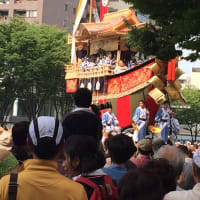
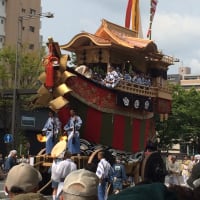
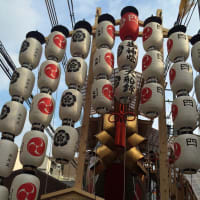
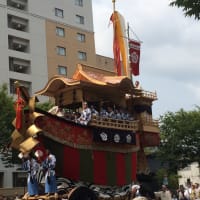
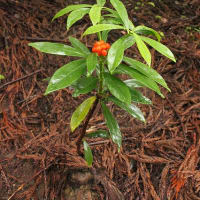
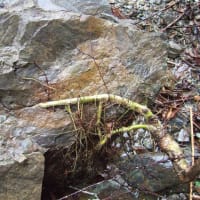
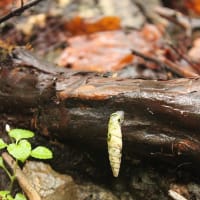
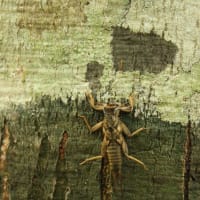
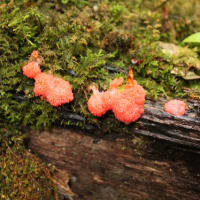
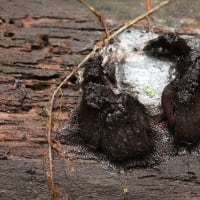

半年ほど前、テレビでマータイさんのインタビューを見たとき、「スゴイ人だな」と感心すると同時に、「新しいムーブメントが興るかも知れない」と思いました。
私は男ですが、買物は自分でします。いつも買物袋(野菜用)とクーラーボックス(魚や肉用)を持って行きます。
レジでいつも思うことは、これだけ環境問題が言われているのに、なぜみんな買物袋を持って来ないのだろう? ということ。
袋やボックスを持って行くのは面倒くさいけど、ビニール袋を捨てる罪悪感もなくなるし、スーパーのポイントは貯まるし、いいことずくめです。
それにしても、fagus06さんの「樹々日記」はブログ初めてとは思えないほど充実していますね。いつも楽しみにしています。
他には、ペットボトルや、トレー、牛乳パックや瓶、アルミ缶など洗ってお店の収集場所に持っていく、資源ゴミは無駄に生ゴミと一緒に捨てない等々ですが、まだまだワンガリ・マータイさんに、もったいないと言われそうです。
父には時々もったいないと言われていました(笑)
英語すらすら読めると良いですね。私には暗号のように見えます(笑)
「そんなもったいないことしたら冥加が悪い」なんて言いませんでしたか?
何気なく意味も知らず使っていましたが、冥加とは「気付かないうちに、受けている神仏の加護や恵みのこと」らしいです。
こういう敬虔な気持ちが今の時代には欠けているのかもしれませんね。
凄いですね~。
scopsさんの暮らす京都では、比較的古いものを活かす土地柄という感じがしますが、
やはり現実は、そうでもないんでしょうか?
消費大国・・・ニッポンですもんね。
TVで見ましたが今、「割り箸」がピンチみたいですね。
「割り箸」分、世界から木がなくなった
ということです。
それこそ、もったいないことです。
ケニアが女性たちが持続的に収穫されるサイザル麻で編んだバスケットを大量に、
それも地方経済を発展させるため
公正な価格で輸出を始める。
この事例は、かつてインドで自国の布を織り、
それを奨励したマハトマ・ガンジーの「糸車(チャルカ)の思想」と似ています。
ガンジーは、この環境問題の中にインド国民の尊厳を問いたんです。
切り口は環境ですが、「もったいない」には自然を敬う人間の生き方が見えますものね。
日本の割り箸は端材を有効利用していましたが、中国産は森を切り開いてのものとか・・・いくら安いといっても、使うほうが節度を持たないととんでもないことになってしまいますね。
京都は古いものを活かしますが、やっぱり「いいもの」だけしか残りませんよね。いいものを作る技術者も大量消費時代に減ってしまっているようなのが残念です。無駄な消費は文化までも消費してしまうのかもしれません。